Assassin's Creed: Origins Wants to Reinvent the Franchise
Assassin's Creed: Origins co-director Ashraf Ismail talks the risks of taking the franchise in a new direction, its fresh RPG leanings, and more.
This article first appeared on USgamer, a partner publication of VG247. Some content, such as this article, has been migrated to VG247 for posterity after USgamer's closure - but it has not been edited or further vetted by the VG247 team.
At the start of my demo of Assassin's Creed: Origins, the first Assassin's Creed in quite awhile by the series' standards, I'm paddling a boat to shore. I'm about to enter the city of Memphis, where my partner Aya is waiting for me. Aya's been away for awhile, serving Cleopatra who is plotting to become queen. It's deep into the game, I'm told, but not too deep.
The premise: with Cleopatra itching to properly rule Egypt, she's allied herself with the familiar Roman Julius Caesar to team up against her brother, Ptolemy XIII, the current King of Egypt. He's a King who cares more for riches than ruling, and thus, is being essentially controlled by shadowy, nefarious people. It's all tapped somewhat out of the history books, but with an Assassin's Creed-twist, of course.
We're given free reign of the region of Memphis for about an hour, along with two quests (a main and side one). I do the typical Assassin's Creeds-y things; I clamber up walls and leap across rooftops, I find precisely one bail of hay to dive into, I decide to stealthily take out some bad dudes. It's here where I'm hit with the most striking change of Origins: its combat, everything about it, feels different. Slower. No longer bent on hack-and-slashing your way through it all, now reliant on careful strategy.
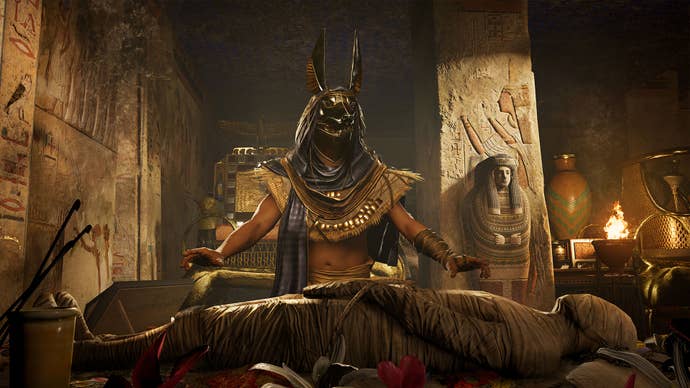
This, this is just one step on Origins' path to reinvent a franchise that's been in turmoil, a series that's had its fair share of hits (Black Flag, Assassin's Creed 2) and faults (Unity, Assassin's Creed 3). A lot though have fallen in-between as middling entries. Meanwhile, Origins is an Assassin's Creed game that never labels its assassination-happy heroes actually as "Assassins," nor its villains the familiar "Templars." Instead it's laying the groundwork for the Assassin's Creeds we'll know to come in the future, paved in a past where the conflict we know well in the later games still exists, just without the names we usually know them by.
Reinventing the series while it's still going—thus, not rebooting—takes a lot of careful steps, as Ubisoft is trying not to alienate the longterm fans while bringing new ones into the mix. They're steps that Ubisoft Montreal, the same team behind fan-favorite Black Flag, are taking into careful consideration. Because you don't take a well-established series in a new direction without estranging a few people first.
Last week I sat down with Origins co-director Ashraf Ismail to talk the new RPG-inclined direction for the series, what this means for the future of Assassin's Creed, and what led the team to pursue the new angle in the first place.
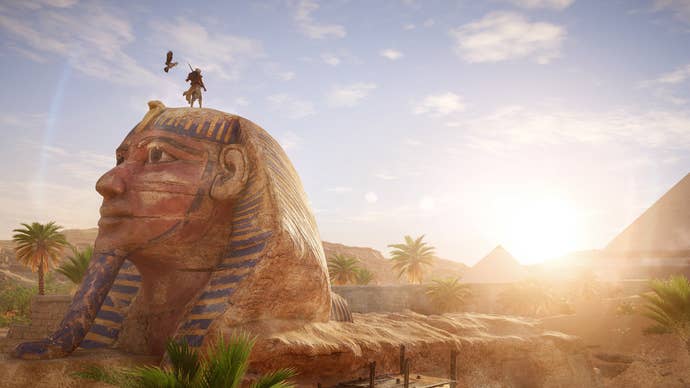
USgamer: I'm actually surprised I haven't seen Egypt in Assassin's Creed yet. What led you to finally exploring that as the next big location for the series?
Ashraf Ismail: We started the project almost four years ago right after we finished Black Flag. Very early on, when we were thinking about what we would do next, Egypt has always been a setting that we wanted to do, and we know it's a setting that fans want as well. But we always felt that it would have been very difficult in the past from a technological point of view to bring such a landscape to life, to be able to fill it with AI and animals. It was really a technology question, at first. Since finishing Black Flag and learning [a lot from it], we learned how to build bigger worlds, we felt that this was a challenge that we could take on. We felt okay, the stars are aligning, we learned a lot, we can finally take it there, and then it was a matter of when in Egypt, because Egypt has a crazy long history. We wanted to go to Ancient Egypt, but we also wanted an Egypt that was already full of mystery, full of mysticism, full of things to discover and find.
We looked all the way back to building the pyramids, but the problem was that there was nothing else around. That's why we settled around 49 BCE, where it was the end of an era. The old world was about to change forever, and by picking such an epic setting with characters like Cleopatra and Caesar, it also meant we could tell a really big story for the series itself. This was really the idea of how Origins came to be, even if in the lore of Assassin's Creed there's always been a conflict between order and free will. With the brotherhood that we see in Assassin's Creed 1, we're now a thousand years before the first Assassin's Creed game. We can tell how did those symbols, how did that group, how did the structure of that all come together. And what was this very personal story, this very personal journey, how did that culminate into the birth of an organization that's lasted for 2,000-some years.
That was something that stuck out to me in the demo, Bayek doesn't go by "Assassin," he's instead a "Medjay." So this definitely feels like the origin of the assassins that we're familiar with in later games, only before they have that name. Will this be the origin for the Templars as well?
AI: Those terms don't exist yet. But the conflict of free will and order—which is the Templar philosophy—these have existed throughout time and the idea is [they're like the] group that is shadowing, controlling Ptolemy XIII. This is the order of ancients that is kind of hinted on in the trailer you saw, this is the group that has order as their philosophy. What this means in terms of the grander link to Templars and all is this is the adventure that we want our players to go on. These ideals are still at the heart of it. It's free will versus order, and what side do you rely on.
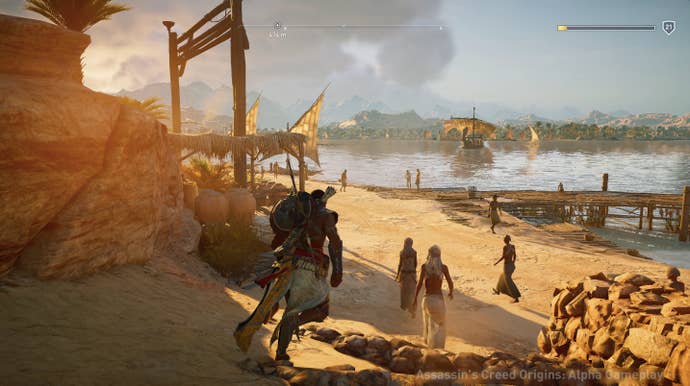
Why did the team decide to go in an RPG direction for Assassin's Creed: Origins, given the series hasn't ventured much in that territory before? Like even the combat feels different, more slow and deliberate. So what inspired that change?
AI: When I said we wanted to reinvent that experience, for us what reinventing means was the narrative structure, the microgameplay, the feel of the game. It fundamentally meant we needed to touch stuff, we needed to touch AI, we needed to touch combat. Even from a player perspective, we wanted to start thinking about different things. When we reflected on Black Flag a lot, one thing we saw is that people consumed the game in two ways: either they were stealth players or warriors. What we felt was that both playstyles are valid, both playstyles are good, and we should actually give players more capacities, more abilities and tools that can help them build the kind of character they want. We've added the bow so there's a ranged playstyle. There's an environment manipulation playstyle. The idea is to build the kind of character you want. You're not stuck to an archetype. You can do a hybrid, you can mix and match, you can do everything if you want—it takes a lot more effort, of course. But the idea was to do that, to let players be able to craft their character in the style they want much more.
So it was natural for us to go in an RPG direction because RPGs have a lot of tropes that it's a mental schema that you understand. You can face a challenge [if you want]. We wanted very epic bosses and challenges in the game, and here it's easy to understand when you see that kind of challenge, like I know the road I need to take to get there, and I have options in my road. It was natural to go that direction. Again, our intention was we're coming up to the 10 year anniversary of Assassin's Creed, we need to change it up, we need to modernize it. We're all big fans of RPGs, so it was natural for us to go in that direction, and I hope people feel it and see it. Even if they want to be a super stealthy assassin, we've worked on stealth quite a lot and the idea is okay, so dedicate yourself. Gain the ability to upgrade your blade, craft to make yourself a lethal one-shot assassin, but [to do so] it takes effort from you, it's not just given to you. You have to work for it, and we assume that.
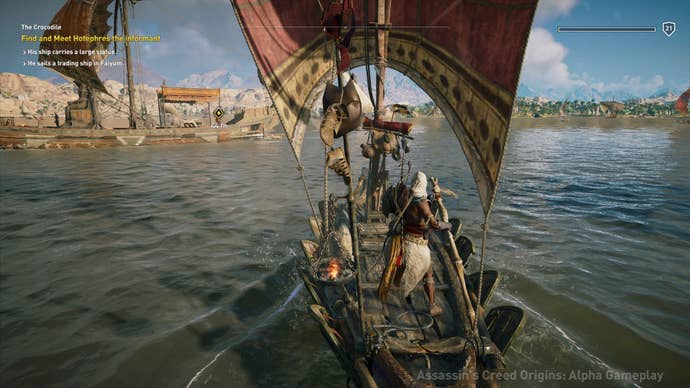
Can we expect another hideout or base mechanic similar to previous games?
AI: It's very different. [The game] starts off with Bayek leaving his home of Siwa to go on his journey and find out what happened there and why did it have to happen. We chose that we wanted a character that had to do a journey through Egypt, to figure out what happened. There is a lot of upgrading to do, and there is a lot of customization. But it's more within the character, more within Bayek, and we rely on a lot of RPG elements to allow players to customize and build up their character through the abilities, through the gear and equipment and so on. There's no necessarily specific home base, but there are things you can do to upgrade different things, [even if] there's no thing as clear cut as a home base.
I noticed that there seems to be more cutscenes, both leading into the quests and at the tail end of them. It seemed definitely more story-heavy, so how long would you say the main campaign will be compared to past games?
AI: We decided to go with a quest structure. We still have a main quest line, and then we have a crazy ton of side quests. The reason we did that is we felt that when we were doing research on Egypt, there were just so many characters and stories that we wanted to tell, but in order to tell them in a way that a player can consume that little bubble of content, that can manage their UI and all this. Quests just made sense, so that's one reason we went to a quest structure, to be able to tell tons of stories.
From early on, we decided to invest in having a huge writing team, being able to build tons of characters and do a lot of cinematic stuff, so yes people can expect that we have a ton of optional side-questing to do. They all have stories, storytelling beats, cinematics, we put a lot of effort into that. One way to gain XP and level up and so on is to do side quests.
So people can expect a lot of that, and for the sidequests, it's... I don't know how many. It's tons. It's a lot. To do the main quest line, this time it's a little bit harder to judge than previous Assassin's Creeds because previous Assassin's Creeds you can technically one-shot it and do the whole thing. Here you do run into parts of the game where you need to level up. So even in the main quest line, you will hit like a boss or a specific moment that is a soft gate that tells you that you need to have a few more levels—you can still take on the challenge, you can try it. You're not blocked. You're never blocked. You can still try it, but yeah.
Okay, so you're just nudged in a different direction. Soft gating is a good phrase for that.
AI: Yeah, it's a soft gate. You're told you're not levelled enough, and there's many different things you can do to level up, so it's hard to say. I can tell you without giving you a number because people play differently, but it's definitely the biggest scope for any Assassin's Creed we've ever done, in terms of the size of the story, the size of the scope of the quests. It's quite huge. It's long.
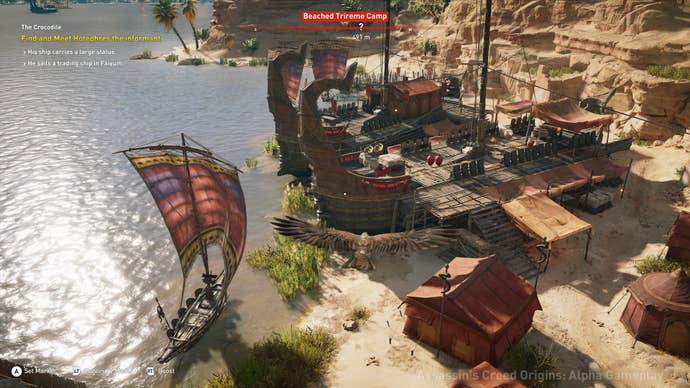
You mentioned that you've looked to other RPGs for inspiration, what particular RPGs inspired you the most either in development or even back in the concepting phase?
AI: One of the first games we looked at, funny enough, was actually Black Flag. Because underneath the hood, the naval system was an RPG mechanic. It was just kinda hidden. We didn't advertise levels and stuff, but it was there. We really looked at how did people consume the content, how did they play the optional stuff. We felt that there was a good success there, so we tried to expand that. Looking at Black Flag, the playtime [for that content] was really huge, there was something interesting there. Also like I said, we're RPG fans. We've looked at many other games, just references of things to know what we want to do, what we don't want to do, what we want to avoid—ranging from Final Fantasy to Skyrim. It honestly started with reflecting off Black Flag and seeing how the naval worked, and we decided to blow it up and make a whole game based around that. We have many reasons why, but it was partly the success of Black Flag.
Since this is arguably the biggest change Assassin's Creed has ever gone through, how do you feel about potential fans that will feel maybe alienated by the huge shift? What do you hope brings them into the fold?
AI: Honestly, when I said our intention at the beginning was to reinvent what it means to be Assassin's Creed and the experience of Assassin's Creed, but it was to make something authentically Assassin's Creed too. The thing is we fully respect the lore. As a game, it takes place in the lore of Assassin's Creed. Everything that's happened with Ezio, Edward, is legitimate. So it's not like a reboot of the franchise. In terms of the lore, in terms of who the brotherhood is and what it means to be an assassin, we respect all that stuff. And in fact, we feel like we've enhanced it. We've taken a lot of the details that people might want answers on, that there's open questions on, and we've tried to give a spin on it so it has meaning for our fans.
Having said that, even internally, sometimes we discuss what does it mean to be Assassin's Creed. Is it the hidden blade? Is it the hood? Is it the philosophy? For us, what we landed on was that we need to change Assassin's Creed. We need to modernize it. We need to make it fresh, it's been ten years. We really need to bring something new, but we're not going to disrespect the series. We're not going to disrespect the fans who have been with us for a long time. If anything, we sincerely hope that they fall in love with this experience and are happy for the changes that come. We pay attention to feedback, we lurk the forums and Reddit and Twitter. So we really pay attention to what concerns people, what's on their mind. I'm convinced that fans are going to love this experience. I'm sure they'll have different takes on it and maybe love some things more than others and some things less, and that's okay. But I feel like we stayed true to what it means to be Assassin's Creed, and the lore, and the heart of the experience I think people will see that it's an Assassin's Creed game. Maybe you didn't feel that in the demo, but I hope you did.
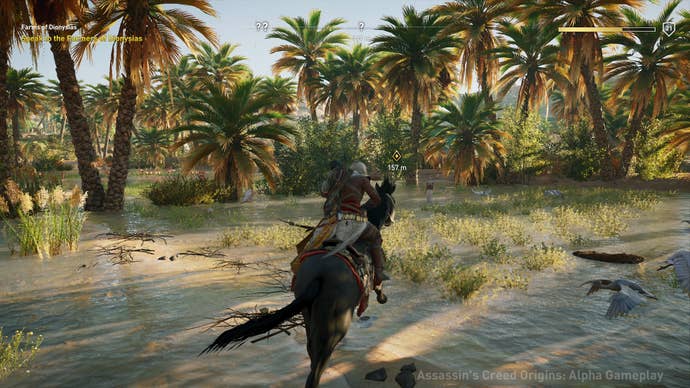
No, yeah, there's definitely still that Assassin's Creed blood there, in my opinion. I think the combat especially was so strikingly different, that it was a big shock for me personally.
AI: The thing with the combat is that every year we do try to put a spin on making it better, improving it. We read what people say, we take on the feedback and we try to assume it. And what we felt was when we challenged ourselves, we said, okay, let's update combat again. Let's do it. What we found was the fundamental philosophy of combat in previous Assassin's Creeds was always the same, and that's why it's never changed that much. The details change but the feeling doesn't change. We felt that we wanted to change that. It was an intention to change that; a willful intention.
This is where we went from a parried-animation system to a hitbox-based system. This is where you feel that drastic change, the feeling of it and the flow of it. Yes, it means there's more depth in the system, there's a learning curve to it, it's not something that you just pick up and master in a few minutes, and we accept the fact that this will take time for people to adjust to. But we feel the value of it is that it has more gameplay value, it enriches the RPG element, it allows us to do boss fights. We have a ton of boss fights in the game, in the main quests, in the side quests, optionally in the world. There are bosses roaming around in the world that you can take on for epic loot. We've willfully made that change, and again, I want people to play it, to give it a chance, to feel it because I firmly believe in it and I'm glad we went in that direction, and I'm excited for people to see the fight sequences that we'll get involved in.
Can you tell me a bit about bosses, since that's a whole new inclusion for the franchise?
AI: Yes, it's quite new. Again, it's one of our early intentions, we wanted boss fights. We wanted to be able to have some boss fights because it's the ultimate challenge of a combat system at some point. In the main quest line you will face some bosses, but we put a lot of effort to put in optional boss fights, whether it's in the side quests. There's gladiator arenas, [which] are optional content where you can find really awesome loot, even some customization outfit stuff, but the challenge of it is to fight unique bosses. There's even bosses that just roam the world. I won't say too much about them because there's a story behind them, but we've got a ton of bosses in the game.
It's for the players who love the combat system, and when I say combat it's not just the melee, it's also ranged combat, combat on vehicles, all that stuff. Some bosses are actually ranged combat bosses. You really, you can't even get close enough to them to attack. You really need to use bows. So it's that type of challenge. Others ride vehicles, so it's a boss fight on a vehicle. It's for the people who love combat, it's a way for them to test the game, test its most difficult, unique challenges, and then be rewarded for it.

